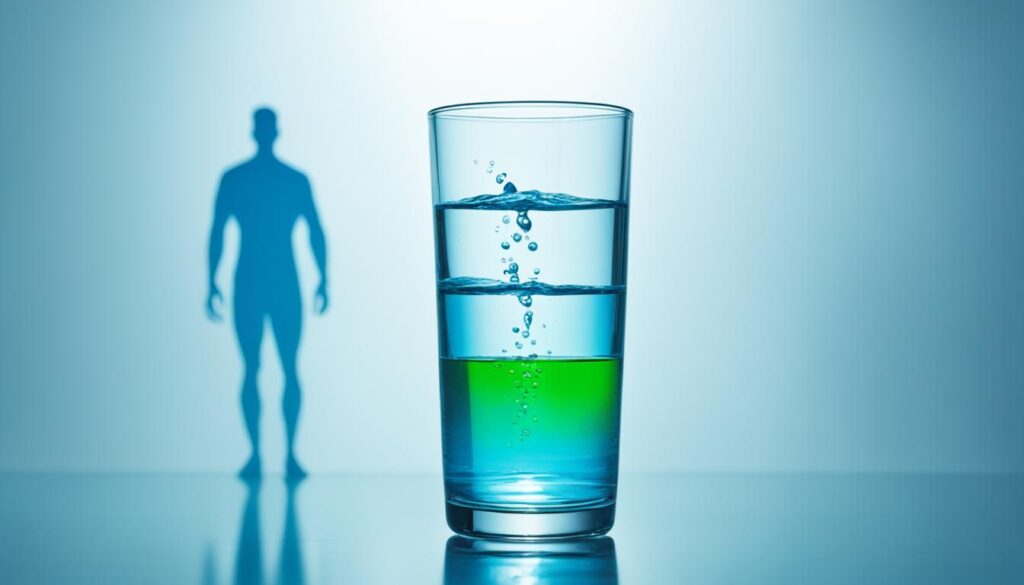The water diet has become popular for its benefits in losing weight and improving health. Studies have looked into how staying hydrated affects our metabolism. They show how drinking water can help us burn fat. Since 60% of our body is water, it’s clear that hydration is key for good metabolism.
Studies say drinking water before meals can help us eat fewer calories and lose weight. A 2016 study found that drinking two glasses of water before eating cut calorie intake by 22%. Another study in 2003 showed that drinking two cups of water made healthy adults’ metabolism 30% faster.
The water diet does more than help with weight loss. It’s vital for keeping our brains working well. Even losing a bit of water (2%) can hurt our thinking, moving, and memory, as studies show. Drinking more water might also help burn fat, as a 2016 review of animal studies suggested.
Key Takeaways
- The water diet can positively impact metabolism and aid in weight loss.
- Drinking water before meals can lead to reduced calorie intake and enhanced fat burning.
- Proper hydration is crucial for maintaining cognitive function and overall health.
- Scientific studies support the benefits of the water diet for weight management and metabolic function.
- Incorporating the water diet alongside a balanced eating plan can optimize its effectiveness.
Introduction to the Water Diet and Its Potential Benefits
The water diet, also known as water fasting, is becoming more popular. It’s seen as a way to boost metabolism, lose weight, and improve health. This method means drinking only water for a few hours up to 72 hours. This fasting can lead to changes in the body that could be very beneficial for health.
One key benefit of water fasting is its effect on weight loss. Without food, the body starts to burn stored fat for energy. This can lead to losing weight. It also helps control blood sugar by making the body more sensitive to insulin and reducing inflammation.
Water fasting has been linked to weight loss, lowering the risk of chronic diseases, and starting autophagy. Autophagy is a process that clears out damaged proteins and parts from cells.
Studies show water fasting can also bring other health perks, such as:
- Lowered blood pressure
- Better cholesterol levels
- Less inflammation
- Improved metabolic efficiency
- Support for autophagy
| Water Fasting Duration | Potential Benefits |
|---|---|
| 16/8 Intermittent Fasting | Improved insulin sensitivity, weight loss |
| 24-72 Hour Fasts | Stimulated autophagy, reduced inflammation |
| Extended Fasts (5+ Days) | Significant weight loss, lowered blood pressure |
Water fasting can have many benefits, but it’s important to be careful. Fasting for too long can cause dehydration and other problems. Always talk to a doctor before starting a water fasting plan, especially if you have health issues or take medicines.
Knowing the good and bad of water fasting helps people make smart choices for their health. Next, we’ll look into how water affects weight loss and metabolism. We’ll also share tips for a safe and effective water diet plan.
The Science Behind Water’s Role in Weight Loss and Metabolism
Water is key to our health, especially when we’re trying to lose weight and boost our metabolism. It’s vital to drink enough water to help our bodies work right and keep weight in check. Let’s look at how water affects our metabolism and helps control hunger and appetite.

Hydration and Its Effect on Metabolic Rate
Drinking enough water is crucial for a healthy metabolism. Not drinking enough can slow down our metabolism, making it harder to lose weight. Water keeps our bodies running smoothly, supporting our metabolism and how we use energy.
A study by Stookey et al. (2005) found many older adults in the U.S. were not well-hydrated. This shows how important it is to drink enough water, especially as we get older, to keep our metabolism strong.
Water’s Impact on Hunger and Appetite Suppression
Water also helps us feel full, which can stop us from eating too much. Drinking water before meals can make us feel satisfied, helping us eat less. This is great for those trying to eat healthier and manage their weight.
Water affects our hunger and fullness by working with hormones in our body. Research shows that a hormone called angiotensin helps control how much water and sodium we drink. A study by Epstein AN et al. (1970) found that this hormone made rats drink more water, showing its effect on thirst and balance.
Jequier and Constant (2010) believe water is a vital nutrient for our health and staying hydrated. Drinking enough water is key for a good metabolism and losing weight.
Angiotensin-converting enzyme (ACE) inhibitors can also help with weight loss. A study by Mathai ML et al. (2008) showed that ACE inhibitors made rats lose body fat and lower their plasma leptin levels. This suggests that drinking water and ACE inhibitors could help with weight control.
| Study | Key Findings |
|---|---|
| Fitzsimons JT (1980) | Angiotensin and other peptides play a role in controlling water and sodium intake |
| Epstein AN et al. (1970) | Injections of angiotensin into the brain of rats induced drinking behavior |
| Mathai ML et al. (2008) | ACE inhibition induced a selective reduction in body fat mass and plasma leptin levels in rats |
Drinking plenty of water and using its appetite-suppressing effects can help control hunger and lead to healthier eating. Adding water to a weight loss plan, along with a good diet and exercise, can boost metabolic health and help with weight management.
The Impact of the Water Diet on Metabolism: A Scientific Perspective
The water diet, also known as water fasting, is getting attention for its effects on metabolism and weight loss. Some studies suggest it can lead to short-term weight loss. But, it’s key to look at the science to see how it affects metabolic processes and health.

Research Studies on Water Fasting and Metabolism
Many studies have looked into how water fasting affects metabolism and weight. One study with 12 middle-aged men found big changes in blood and urine markers and a drop in weight after an 8-day fast. Another study with 48 people showed weight and BMI went down after a 10-day fast.
But, almost half of the people in the second study quit because of health issues like headaches and vomiting. Water fasting can cause problems, even in a hospital setting, like fatigue and back pain. It can lead to short-term weight loss, but the long-term effects are not proven.
A review of scientific evidence says we need more research on water fasting and metabolic health.
How Water Diets Influence Fat Burning and Metabolic Processes
Water diets might help with fat burning and metabolic processes. Drinking more water can help with weight loss by making you eat less and speeding up metabolism. It can also reduce water weight by affecting sodium retention and hormones.
But, the benefits of water fasting on metabolism don’t last long. Blood pressure, cholesterol, and blood sugar levels go back to normal after eating again. People doing long water fasts lose a lot of lean mass and some fat, which is different from usual weight loss.
Even though there are no serious risks like metabolic acidosis or death from long water fasts, it’s still wise to be careful. It’s best to try water fasting with a doctor’s advice, especially if you have health issues like diabetes.
Intermittent fasting, especially time-restricted eating (TRE), looks promising for weight loss, blood sugar control, and brain health. A study with over 100,000 participants found benefits like more energy, better digestion, less bloating, and weight loss.
New research is showing intermittent fasting could be good for brain and mental health, and memory. But, it’s not for everyone. Always talk to a doctor before starting it.
Implementing a Water Diet Safely and Effectively
Thinking about a water diet for its metabolic benefits? It’s key to do it safely and right. The TrueNorth Health Center has helped over 10,000 patients in 30 years with water fasting. They’ve seen big drops in blood pressure and cut medical costs.
Recommended Water Intake for Optimal Metabolic Function
Drinking enough water is key for a water diet. Aim for at least 8 glasses (64 ounces) a day. Some say up to 2 liters (68 ounces) can help with weight loss.
During a 24-72 hour fast, people usually drink 2 to 3 liters of water. A study of 30 healthy adults showed that a 24-hour fast lowered triglycerides in the blood. This is good for heart health.
Combining Water Diets with Healthy Eating Habits
Water fasting can boost metabolic health, but eating right is also crucial for lasting success. Studies link it to lower risks of diabetes, cancer, and heart disease. Drinking water can lower triglycerides in the blood.
For lasting benefits, mix safe water fasting with healthy eating. This combo can improve metabolic function and lead to lasting results.




